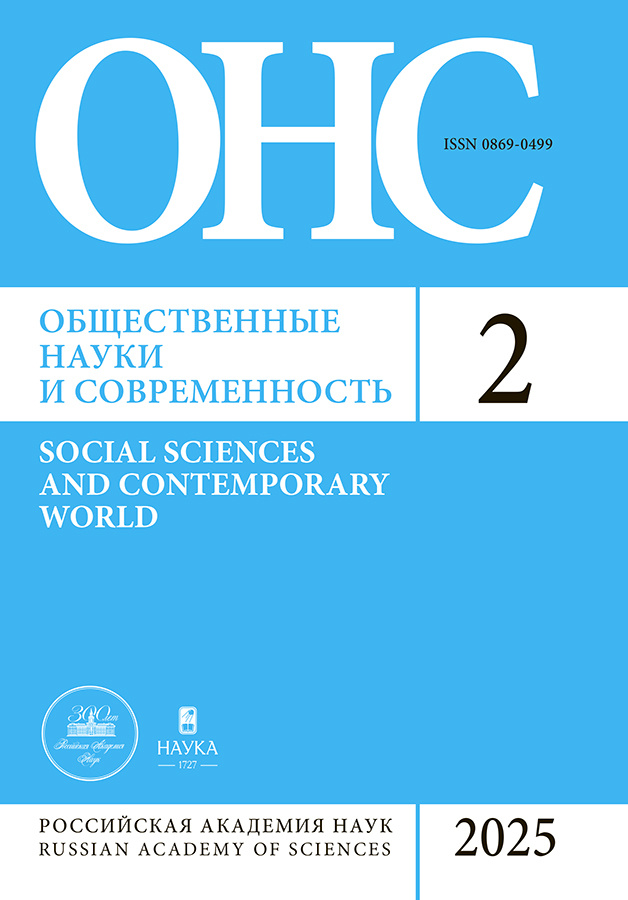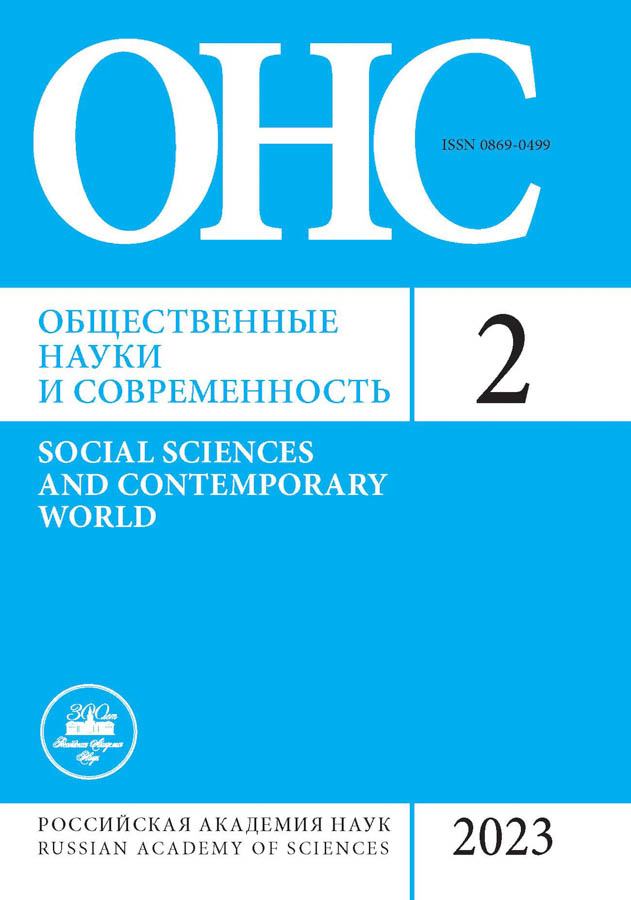Adaptation of russian small business to COVID-19 pandemic shocks: the first evidence of a longitude
- Authors: Chepurenko A.Y.1, Galitsky E.B.1,2, Oslon A.A.1,2
-
Affiliations:
- National Research University “Higher School of Economics”
- Institute of the Public Opinion Foundation
- Issue: No 2 (2023)
- Pages: 90-110
- Section: Articles
- URL: https://permmedjournal.ru/0869-0499/article/view/675202
- DOI: https://doi.org/10.31857/S0869049923020065
- EDN: https://elibrary.ru/CEMGZW
- ID: 675202
Cite item
Abstract
Using the data of two waves of the longitudinal project started by the ‘Public opinion’ Foundation (July - November 2021, initial N = 750 people), the dynamics of strategies and factors of Russian small business’ adaptation to the shocks caused by the COVID-19 pandemic are examined. It is shown that: (1) assessment of the situation in the economy and in their own business correlates with the respondents’ business strategy - entrepreneurs with the growth strategy are more often positive about the general economic situation than those who are focused on stability or surviving. (2) The motivation to do business affects the assessment of the situation and the response to it. Those who conduct business for the purpose of self-fulfillment more often than others assess the state of their business affairs positively, while those who conduct business out of necessity more often evaluate it negatively. (3) Depending on the change of the current income, small entrepreneurs can quickly change the strategy, whereas the reduction in current income affects the change in strategy more strongly than their increase: entrepreneurs with decreasing business income are more likely to change the strategy to a more conservative one (“stability” or “survival”), while income growth to a lesser extent leads to a change in strategy to a more active one (“development”).
Keywords
About the authors
Alexander Yu. Chepurenko
National Research University “Higher School of Economics”
Email: achepurenko@hse.ru
Moscow, Russia
Efim B. Galitsky
National Research University “Higher School of Economics”;Institute of the Public Opinion Foundation
Email: galitskiy@fom.ru
Moscow, Russia;Moscow, Russia
Alexander A. Oslon
National Research University “Higher School of Economics”;Institute of the Public Opinion Foundation
Email: oslon@fom.ru
Moscow, Russia;Moscow, Russia
References
- Егорова А.И., Чепуренко А.Ю. (2023) Факторы упругости малого предпринимательства в условиях внешних шоков в России (по данным лонгитюдного исследования) // Российский журнал менеджмента. № 1. С. 172-197.
- Ослон А.А., Никифорова Е.А., Богомолова Е.В., Петренко Е.С., Кот Ю.А. (2022) На пути к антихрупкости. Как компании переживают коронавирус. М.: ИнФОМ.
- Чепуренко А.Ю., Галицкий Е.Б., Духон А.Б., Ослон А.А. (2021) Государственная политика в отношении малого предпринимательства в период пандемии в оценках бенефициаров // Вопросы государственного и муниципального управления. № 4. С. 66-89.
- Чепуренко А.Ю., Образцова О.И. (2020) Предпринимательская активность в России и ее межрегиональные различия // Журнал Новой экономической ассоциации. Т. 14. № 2. С. 199-211.
- Ajzen I. (1991) The Theory of Planned Behavior // Organizational Behavior and Human Decision Processes. No. 50. Pp. 179-211.
- Ajzen I. (2002) Perceived Behavioral Control, Self-efficacy, Locus of Control, and the Theory of Planned Behavior // Journal of Applied Social Psychology. No. 32. Pp. 665-683.
- Álvarez Jaramillo J., Zartha Sossa J.W., Orozco Mendoza G.L. (2019) Barriers to Sustainability for Small and Medium Enterprises in the Framework of Sustainable Development - Literature Review // Business Strategy and the Environment. No. 28. Pp. 512-524.
- Amorós J. E., Ciravegna L., Mandakovic V., Stenholm P. (2019) Necessity or Opportunity? The Effects of State Fragility and Economic Development on Entrepreneurial Efforts // Entrepreneurship Theory and Practice. No. 43. Pp. 725-750.
- Bartik A. W., Bertrand M., Cullen Z., Glaeser E. L., Luca M., Stanton C. (2020) The Impact of -COVID-19 on Small Business Outcomes and Expectations // Proceedings of the National Academy of Sciences. No. 117. Pp. 17656-17666.
- Belda P.R., Cabrer-Borrás B. (2018) Necessity and Opportunity Entrepreneurs: Survival Factors // International Entrepreneurship and Management Journal. No. 14. Pp. 249-264.
- Belitski M., Guenther C., Kritikos A. S., Thurik R. (2022) Economic Effects of the COVID-19 Pandemic on Entrepreneurship and Small Businesses // Small Business Economics. No. 58. Pp. 593-609.
- Briguglio L., Cordina G., Farrugia N., and Vella S. (2009) Economic Vulnerability and Resilience: Concepts and Measurements // Oxford Development Studies. No. 37. Pp. 229-247.
- Carsrud A., Brännback M. (2011) Entrepreneurial Motivations: What Do We Still Need to Know? // Journal of Small Business Management. No. 49. Pp. 9-26.
- Castro M.P., Zermeño M.G.G. (2020) Being an Entrepreneur Post-COVID-19-resilience in Times of Crisis: A Systematic Literature Review // Journal of Entrepreneurship in Emerging Economies. No. 13. Pp. 721-746.
- COVID-19 and Entrepreneurship: Challenges and Opportunities for Small Business (2021) Ed(s): Ratten V. Milton Park: Routledge. 136 p. (https://doi.org/10.4324/9781003149248).
- Cowling M., Liu W., Ledger A., Zhang N. (2015) What Really Happens to Small and Medium-sized Enterprises in a Global Economic Recession? UK Evidence on Sales and Job Dynamics // International Small Business Journal. No. 33. Pp. 488-513.
- Davidsson P., Gordon S.R. (2012) Panel Studies of New Venture Creation: A Methods-focused Review and Suggestions for Future Research // Small Business Economics. No. 39. Pp. 853-876.
- DeDee J.K., Vorhies D.W. (1998) Retrenchment Activities of Small Firms During Economic Downturn: An Empirical Investigation // Journal of Small Business Management. No. 36. Pp. 46-61.
- Dess G.G., Lumpkin G.T., Covin J.G. (1997) Entrepreneurial Strategy Making and Firm Performance: Tests of Contingency and Configurational Models // Strategic Management Journal. No. 18. Pp. 677-760.
- Fabeil N.F., Pazim, K.H., Langgat J. (2020) The Impact of Covid-19 Pandemic Crisis on Micro-enterprises: Entrepreneurs' Perspective on Business Continuity and Recovery Strategy // Journal of Economics and Business. No. 3. Pp. 837-844.
- Fairlie R. (2020) The Impact of COVID-19 on Small Business Owners: Evidence from the First Three Months after Widespread Social-distancing Restrictions // Journal of Economics & Management Strategy. Vol. 29. Pp. 727-740.
- Herbane B. (2010) Small Business Research: Time for a Crisis-based View // International Small Business Journal. No. 28. Pp. 43-64.
- Jansson J., Nilsson J., Modig F., Hed Vall G. (2017) Commitment to Sustainability in Small and Medium-sized Enterprises: The Influence of Strategic Orientations and Management Values // Business Strategy and the Environment. No. 26. Pp. 69-83.
- Kitching J., Blackburn R., Smallbone D., Dixon S. (2009) Business Strategies and Performance During Difficult Economic Conditions. Project Report. (http://www.berr.gov.uk/files/file51879.doc).
- Kuckertz A., Brändle L., Gaudig A., Hinderer S., Reyes C.A.M., Prochotta A., Steinbrink K.M., Berger E. S. (2020) Startups in Times of Crisis - A Rapid Response to the COVID-19 Pandemic // Journal of Business Venturing Insights. Vol. 13. (https://doi.org/10.1016/j.jbvi.2020.e00169).
- Liguori E.W., Pittz T.G. (2020) Strategies for Small Business: Surviving and Thriving in the Era of COVID-19 // Journal of the International Council for Small Business. No. 1. Pp. 106-110.
- Meyer B.H., Prescott B., Sheng X.S. (2022) The Impact of the COVID-19 Pandemic on Business Expectations // International Journal of Forecasting. No. 38. Pp. 529-544.
- Reynolds P.D. (2011) New Firm Creation: A Global Assessment of National, Contextual, and Individual Factors // Foundations and Trends in Entrepreneurship. No. 6. Pp. 315-316.
- Sadler-Smith E. (2004) Cognitive Style and the Management of Small and Medium-sized Enterprises // Organization Studies. No. 25. Pp. 155-181.
- Sarasvathy S.D. (2001) Causation and Effectuation: Toward a Theoretical Shift from Economic Inevitability to Entrepreneurial Contingency // The Academy of Management Review. No. 26. Pp. 243-263.
- Sayal A., Banerjee S. (2017) Factors Influencing Performance of SMEs: Literature Review and Research Propositions for SMEs // The Marketing Review. No. 17. Pp. 3-32.
- Shane S., Locke E.A., Collins Chr. J. (2003) Entrepreneurial Motivation // Human Resource Management Review. No. 13. Pp. 257-279.
- Simpson M., Padmore J., Newman N. (2012) Towards a New Model of Success and Performance in SMEs // International Journal of Entrepreneurial Behavior & Research. No. 18. Pp. 264-285.
- Smallbone D., Deakins D., Battisti M., Kitching J. (2012) Small Business Responses to a Major Economic Downturn: Empirical Perspectives from New Zealand and the United Kingdom // International Small Business Journal. No. 30. Pp. 754-777.
- Stephan U., Hart M., Mickiewicz T., Drews C.-C. (2015) Understanding Motivations for Entrepreneurship. Birmingham: Enterprise Research Centre.
Supplementary files











